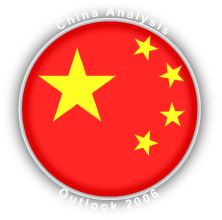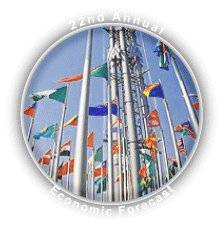China Analysis and Outlook 2006 reveals an emerging opportunity to rebalance economic and political influence.
 Part II of the 2006 Economic Forecast featuring David Hale (presented Part I) and Lyric Hughes-Hale. Here, I present my notes of Lyric’s talk, followed by my observations.
Part II of the 2006 Economic Forecast featuring David Hale (presented Part I) and Lyric Hughes-Hale. Here, I present my notes of Lyric’s talk, followed by my observations.
Background: China’s development and situation are far more complex than U.S. news sources report. It has seen significant economic liberalization during the past 25 years, and it shows every sign of continuing on that trajectory. However, the country is politically conservative. There is no freedom of the press. That said, the authoritarian government may produce reform much more quickly than if China had been democratic because the democratic process often slows reform. China is far more open and engaged on the world stage than it has been in many years. […]

